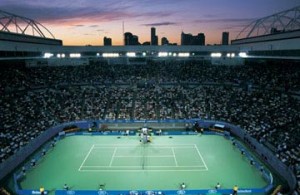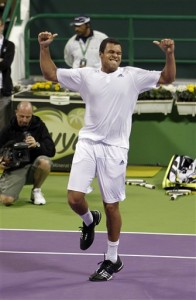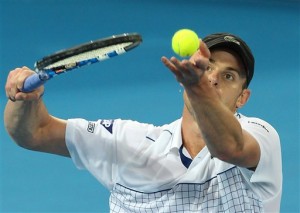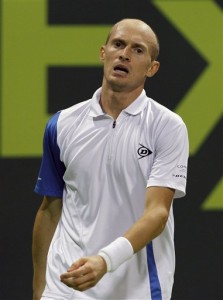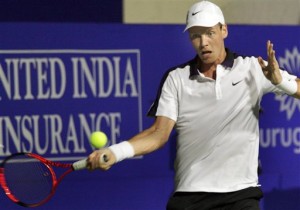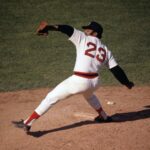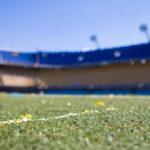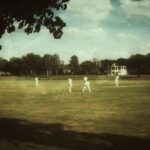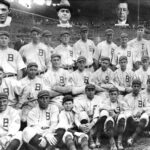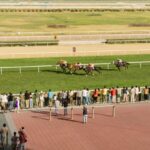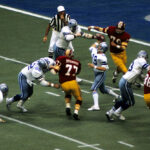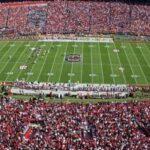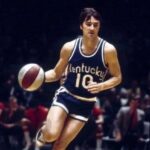Federer? Nadal? 10 Men Who Can Win the Australian Open, Part 1
The Australian Open begins on Monday, Jan. 17, in Melbourne, Australia.
The draw for the first Grand Slam of the season will not be held until Friday, Jan. 14.
Until that time, no one will know who they will be facing in the first round or which potential opponents might be waiting down the road.
According to oddsmakers, Rafael Nadal is slightly favored to win the title over Roger Federer.
So what do these betting gurus know?
They know about past patterns of behavior and predictable outcomes based on certain incontrovertible factors. They know about odds of winning.
“Beating the odds” means winding up with an unexpected outcome.
This is the crux of betting—figuring out which players may beat the odds.
Nothing is a given, although based on recent history it is not unreasonable to expect either Roger Federer or Rafael Nadal to win the championship in Melbourne.
It is almost inevitable that one of them will be in the final.
But that did not happen in 2008, and who is to say that 2011 could not repeat that aberration?
According to this author’s research, following are the 10 players with the best shot at winning in Melbourne…
No. 10: Jo-Wilfried Tsonga
The 25-year old Frenchman is perhaps one of the purest athletes playing tennis today.
With his movement on court, his brilliant net play and his powerful serves, Jo-Wilfried Tsonga has all of the tools necessary to win the Australian Open.
In the past few years, the Frenchman has shown his best major results in Melbourne.
In 2007, at his first Australian Open, Tsonga lost his opening round match to Andy Roddick.
In 2008, unseeded, Tsonga made it all the way to the finals where he faced the No. 3 seed, Novak Djokovic.
At the start of that tournament, Tsonga shocked the tennis world by upsetting No. 9 seed Andy Murray in the first round.
Prior to that first match, Murray was touted as one of the favorites to win the Australian Open in 2008.
After dispatching Murray, Tsonga beat all opponents standing in his way including the No. 2 seed Rafael Nadal in the semifinals.
The Frenchman won the opening set against Djokovic before the Serb took control, winning the match and his first Major championship.
In 2009, Tsonga lost to a surging Fernando Verdasco in the quarterfinals, disappointed not to have recaptured his glory of 2008.
In 2010, the Frenchman had another splendid Australian Open tournament, making it all the way to the semifinals where he lost to Roger Federer, the eventual champion.
Ironically, Tsonga had defeated Novak Djokovic in five tough sets in the quarterfinals.
The last three years Tsonga had outstanding results at the Australian Open. He is healthy and fit again this year and there is no reason he cannot succeed.
Much depends on the draw and the Frenchman’s level of confidence, which should be very high in 2011.
He will be considered a dark horse at 40-1, but definitely someone to watch as the Australian Open gets underway.
No. 9: Andy Roddick
Will this be the year and the tournament when Andy Roddick finally wins his second slam title?
The 28-year old American has not captured a major trophy since the 2003 U.S. Open.
This year Roddick enters competition at the Aussie Open rested and ripped––fit and ready to make this year the one that matters.
In all his years of competition, Roddick has never made it into an Australian Open final.
The American, however, has made the semifinals four times. In 2003 he lost to German Rainer Schuettler in four sets––so close to making the final.
In 2005 the American progressed to the semis where he met and was defeated by Aussie Lleyton Hewitt. In 2007 and in 2009 Roddick found himself facing Roger Federer. He lost both semifinal matches in straight sets.
Roddick made the quarterfinals twice, losing to Marat Safin in 2004 and to Marin Cilic in 2010.
His poorest showings came in 2008 when he lost to German Philipp Kohlschreiber in the third round in a tough five-set loss.
Roddick lost in the fourth round to Marcos Baghdatis in 2006––the year the Cypriot made it all the way to the finals.
Roddick’s worst defeat came during his first year of competition in 2002 when the American fell to Ivan Ljubicic in the second round.
While Wimbledon may offer Roddick the greatest chance to win a major, the American is always a threat on any surface, especially when his serve is hitting the mark and when he is healthy and ready to rumble.
In 2011 Roddick could own the Plexicushion in Melbourne and win it all . The latest odds have the American at a 30-1 shot.
No. 8: Juan Martin del Potro
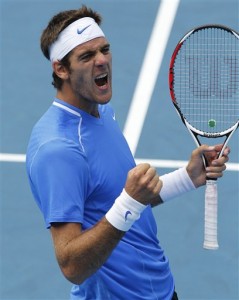
After being sidelined for much of 2010, del Potro will return to the Australian Open with many unknowns.
Winning the Australian Open should be a real long-shot for the 22-year-old Argentine. But current odds rank Juan Martin del Potro at 20-1.
Probably the other Argentine, 29-year old David Nalbandian, would be a better choice. But del Potro has the determination to win a major while Nalbandian, who has the game, has proven he does not.
Still after being injured for almost a year, it would be a miracle for del Potro to return to form so quickly.
Del Potro’s ranking plumetted to No. 258 because of his long absence from the tour.
This week he began a new season of tennis in Sydney where he met and defeated the No. 6 seed Feliciano Lopez in his opener.
At the Argentine’s first Australian Open in 2007, del Potro lost in the second round to Fernando Gonzalez who went on the to finals where the Chilean lost to Roger Federer in straight sets.
In 2008, del Potro lost again in the second round to Spaniard David Ferrer, then ranked No. 5 in the world.
In 2009, the Argentine went all the way to the quarterfinals where he was embarrassed by Roger Federer 6-3, 6-0, 6-0.
Ironically, this would be the year that del Potro would meet and defeat Federer in the finals of the 2009 U.S. Open.
In 2010, suffering from the wrist injury that would sideline him for the rest of the season, del Potro lost in the fourth round to Marin Cilic in five sets 7-5, 4-6, 5-7, 7-5, 3-6. That was the Argentine’s final tournament until the Thailand Open in late September.
Del Potro lost in the first round in Bangkok and Tokyo before shutting down for the remainder of the year to concentrate on resting his wrist, eventually gaining strength and building stamina.
The tennis world watches to see how long it will take del Potro to regain his edge and start winning majors again. According to the odds makers––it will not be that long.
No. 7: Nikolay Davydenko
The Russian Nikolay Davydenko is currently ranked No. 22––this the result of a recurring, persistent wrist injury that kept Davydenko sidelined for a large part of 2010.
The Russian fell out of the top ten for the first time since July of 2009, although for the most part, Davydenko has resided in the top ten since June of 2005.
This past week in Qatar, Davydenko reached the finals of the ExxonMobil Open by defeating Rafael Nadal in the semifinals.
The Russian could not, however, get past Roger Federer in the finals which Davydenko lost 3-6, 4-6.
His results at the Australian Open have been consistently good since 2005––but still the Russian has never made it past the quarterfinal round which explains why his odds are listed at 40-1.
Playing his fifth Australian Open in 2005, Davydenko made it all the way to the quarterfinals where he met Andy Roddick. The Russian was forced to retire in the match after falling behind 3-6, 5-7, 1-4.
It marked the first time the Russian had ever reached the quarterfinal of any major.
In 2006 Davydenko reached the quarterfinals again where he met Roger Federer, losing that contest 4-6, 6-3, 6-7, 6-7. Federer went on to win the 2006 Australian Open.
The next year in 2007 Davydenko once again made it to the quarterfinals in Melbourne but this time the Russian fell to Tommy Haas 3-6, 6-2, 6-1, 1-6, 5-7 in a hard-fought 5-set contest.
In 2008, the Russian went out in the fourth round to countryman Mikhail Youzhny 6-7, 3-6, 1-6.
While participating in a tournament in Chennai in 2009, Davydenko sustained a left heel injury and had to withdraw from that tournament and from the 2009 Australian Open as well.
The injury curtailed the Russian’s playing activity for some time that year.
In 2010, Davydenko again found himself across the net from his arch-rival Federer during the Australian Open quarterfinals and once again he lost 6-2, 3-6, 0-6, 5-7. Federer went on to win his fourth Australian Open title.
The knock against Davydenko has been his inability to win five set matches in majors even when holding a lead.
A lucky draw might aid the Russian this year. Davydenko needs to avoid playing Federer until the final.
No. 6: Tomas Berdych
Tomas Berdych made the finals of the 2010 U.S. Open.
After his success, even though Berdych lost to Rafael Nadal in that final, there is every reason to believe that if the Czech controls his nerves, he has a good chance of winning his first major down under in Melbourne in 2011.
Currently ranked World No. 6, Berdych moved into the top ten in men’s rankings in July of 2010 after reaching the semifinals of the French Open.
Still, Berdych’s previous experiences at the Australian Open have not been that outstanding which explains why his odds remain at 30-1.
The Czech’s first Australian Open took place in 2004 where he lost in the second round to Andre Agassi, 0-6, 2-6, 4-6.
The following year Berdych lost in the opening round of the 2005 Australian Open to Guillermo Coria 2-6, 4-6, 0-6.
In 2006 the Czech lost in the second round to Frenchman Gilles Simon 3-6, 2-6, 6-4, 2-6. But this time Berdych won a set, his first at the Australian Open.
The improvement continued in 2007 when Berdych made it all the way to the fourth round where he met and was defeated by Russian Nikolay Davydenko 7-5, 4-6, 1-6, 6-7.
Berdych fell victim to Roger Federer during the fourth round of the 2008 Australian Open 4-6, 6-7, 3-6
Once again in the fourth round, Berdych lost to Roger Federer at the 2009 Australian Open in five sets 6-4, 7-6, 4-6, 4-6, 2-6.
This loss was especially disconcerting after leading the Swiss two sets to love. It seemed to heighten the estimation that Berdych did not have the confidence or the determination to win a major.
Last year in 2010, Berdych found himself on the way out earlier than usual, victim to Evgeny Korolev of Kazakhstan 4-6, 4-6, 5-7. The second round upset by the Russian did not sit well with Berdych who worked hard after that loss to turn things around.
Solidly ensconced in the top ten, Berdych must be one of the favorites to win going into the first major of 2011.
The Australian Open always seems to offer-up surprising finalists, so why not Berdych this year?
Click here to read the second part.
